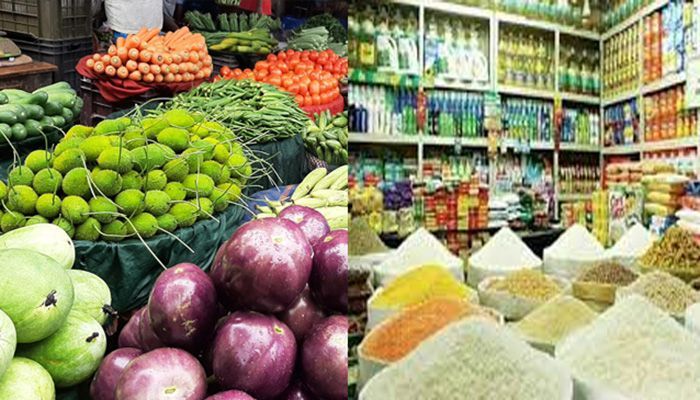
Desk Report
Publish: 14 Oct 2021, 01:55 pm

Representational Image || Photo: Collected
The recent price hike of
essentials in Bangladesh, particularly in the capital, has dealt a double blow
to the poor and the middle-income group of people already hit hard by
unemployment and salary cuts due to the Covid-19 pandemic. The prices of rice,
pulses, soybean oil, flour, sugar, curry, fish and meat are increasing day by
day. The middle class, the poor, the working and the helpless are suffering
because of the rising prices of these necessities.
According to the Trading
Corporation of Bangladesh (TCB), prices of essential commodities have risen by
about 19.64 per cent in a month, the highest ever in a month. Last month, the
price of broiler chicken was Tk 135 to Tk 145 per kg, but in less than a month,
the price has gone up by around Tk 40-45 per kg. At present these chickens are
being sold at Tk 165 to Tk 180.
Mohabbat Hossain, who works
in a private company, said his child prefers to eat chicken rather than fish.
He is terrified of the rising price of chicken. He also lamented that it was
not possible for a person working in a private company with such a low salary
to buy any meat other than chicken.
Turning to Karwan Bazar,
Hatirpul, Palashi, Newmarket Raw Bazaar in the capital, there was a mixed reaction
among buyers and retailers.
It has been learned that
winter vegetables have arrived in the market before the onset of winter.
However, dissatisfaction among buyers is evident due to rising prices in most
of the vegetable markets in the capital. Soybean oil 130-140, onion 80-100, Luffa
60 to 80, Snake gourd 50, Yardlong bean 80, Pointed gourd 50 to 80, potato 60, Sponge
gourd 50, eggplant is being sold at 50 to 80 taka per kg depending on the size
and variety. Calabash 50 to 60 taka and Wax gourd 50 taka a piece. Besides,
capsicum tk 240, bean tk 100 to tk 140, tomato tk 140 to tk 180, cauliflower tk
50 per piece, cabbage tk 50 and Arum-lobe are being sold at tk 60 per kg. Green
chilies are being sold at tk 160 to tk 200. Although the price of eggs has
come down, the prices of fish, meat and oil have also gone up in an unusual
way.
Vendors say early winter
vegetables are coming in the market. So the price is a little higher. However,
once the winter begins, the vegetable price will fall again. Then the price of
vegetables will be within the reach of the common buyers. Although there is
discomfort in the price of meat, the sellers are not saying anything in this
regard.
It has been seen that 25
grams of chili are being sold at tk 35 to tk 40. Buyers are worried about the
onion. The price of onion has already gone up to tk 60. Although the price of
small garlic is tk 60 per kg, the price of big garlic is tk 60; But the price
of Indian garlic is one hundred and fifty taka(s) per kg.
Working people are the most
vulnerable to rising commodity prices. Again, low-income people are struggling
to make ends meet. There are many people in this city who earn 10 thousand taka(s)
monthly. The story of their daily life is very sad. The income of the lower
middle class has also declined, But the level of expenditure has increased.
They have to be frustrated to run the family by borrowing money to handle this
cost. As a result, it has become difficult for them to maintain the cost for
their family.
The Bangladesh Agricultural
Research Council (BARC) says prices of rice, potatoes and onions have risen due
to the government's failure to control the syndicate. Why can't the government
control this syndicate? Is the syndicate stronger than the government?
Economist Dr. Asaduzzaman, a
former research director at the Bangladesh Institute of Development Studies
(BIDS), said they have ties to policymakers somewhere. That is the relation of
transaction. Otherwise, it can't happen. No one is controlling them. If you
benefit from it, how do you control it?
Rice and flour are sold in the open market by the government. Besides, oil, sugar, pulses, and onions are sold at the initiative of TCB. The line fell in front of TCB's truck and OMS shop as it was available at a lower price than the market. In different parts of the capital, middle-class to lower class people are seen standing in line to buy rice and flour from open market trucks. They stand in line for a long time even in the scorching sun to buy 5 kg of rice and 3 kg of flour. These middle-class people are being forced to stand in line in the hope that some money will be saved.
One person who came to buy
TCB products said it was insulting to me, But I have no other choice. Her
family members have halved food since the price of food went up. Absolutely
stopped eating meat.
The sellers said that in the
past, low-income people used to come to Truck-sell to buy daily necessities at
low prices; Especially day laborers, rickshaw pullers, motorists or domestic
workers. But now the middle class is flocking to buy goods on that line, which
is also an additional pressure for them. We usually sell to low-income people.
Now the picture is different. Many are crowding because it is less than the
general market. Earlier it would have been an evening to finish the sale of our
goods. Now it's all over in a couple of hours. Many are going back without
getting it as our allocation is much less than the demand.
Subscribe Shampratik Deshkal Youtube Channel
Topic : Price Hike Daily Commodities
© 2024 Shampratik Deshkal All Rights Reserved. Design & Developed By Root Soft Bangladesh